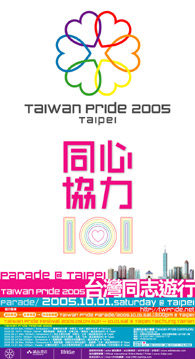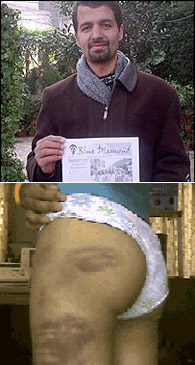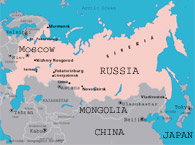Taipei gears up for its 3rd pride parade this Saturday; gay activists protest new draft blood donation legislation
As Taipei gears up for its third pride parade this Saturday, gay rights activists have expressed their dissatisfaction with new draft blood donation legislation originally intended to rectify the old rules which banned gay men outright.

Other than signifying the date, the name Gay Pride 101 Parade refers to the Taipei 101 building, which is often regarded as a giant phallic symbol. In addition, the numbers 1 and 0 typically refers to the sexual roles of gay men.
"They [DOH] took care of the 'identity' part by not saying 'gays,' but what do you call MSMs then?" said Ashley Wu, director of public affairs at the Taiwan Tongzhi Hotline Association (tongzhi, meaning comrade, is now commonly used to mean to lesbians and gay men).
Gay-rights activist J.J. Lai said that the regulations - despite the change in wordings - still discriminated against gays and were too flawed to be practical.
"These regulations are discriminatory because anyone who doesn't practice safe sex falls in the high-risk group, not just gays," he said. "They equate AIDS with being gay, doing nothing to help AIDS prevention."
In responding to the protests, a DOH spokesman said that the Taiwanese requirements follow blood-donation regulations of countries such as the US and Canada, which have banned MSM from donating blood since 1983 as they are thought to be at increased risk for transmitting HIV, the virus that causes AIDS.
Earlier this month, an Italian hospital has been ordered to lift a ban on gay blood donors that sparked a storm when it emerged earlier this month.
Chu Wei-cheng, a professor who has researched gay issues and literature at National Taiwan University, attributed the government's ban on gays donating blood based on a misunderstanding of the AIDS problem caused by ignorance, and called for sex education to be addressed.
The DOH and experts will review the draft regulations in light of the protests.
Democratic Progressive Party Legislator Cheng Yun-peng expressed support for the parade and called for non-discrimination against gays in society. He will be participating in the Gay Pride 101 Parade along with other legislators, and vowed he would try to amend laws regarding indecency charges on gays in the future.
The Gay Pride 101 Parade will be held in Taipei and the parade route will begin at Eslite Bookstore on Dunhua S Road, then cross Zhongxiao E Road and end in Xinyi District, near the Taipei City Hall Station.
Related site:
Taiwan Pride 2005
POST/READ COMMENTS
Transsexual assaulted by cops for refusing sexual favours
An HIV positive transgendered woman in Thamel, the tourist hub of the Nepal capital, was allegedly beaten up by police and held in a police station for 24 hours for refusing to have sex with policemen. The incident occurred on Saturday night following a street scuffle between policemen in plainclothes and a group of gay men and metis - a local term for MtF transgendered persons or men who dress up as women.

Top pic: Sunil Pant with the new Blue Diamond magazine, with editions in English and Nepali. Bottom pic: Photo of victim as a result of Police assault, provided by Blue Diamond Society.
According to Blue Diamond Society (BDS), Nepal's only gay rights organisation, Kala Rai who is transgendered, was told by officers at the Durbar Marg Police Station that she could either pay them 1,800 Nepalese rupees (US$25) in "compensation" or be jailed for six months and pay a fine of up to 28,000 Nepalese rupees on a public offence charge.
A scuffle ensued after a 21-year-old meti refused the advances of a persistent policeman who burnt her hand with a lit cigarette end. Her companions retaliated against the policemen who later came back with more friends.
The policeman, who was said to have started the trouble, was hit on the head by a stone, His companions then caught hold of Rai while the others escaped. She was kicked and punched before taken to the police station.
She was released on Sunday after her friends paid the policemen 1,000 Nepalese rupees. According to Pant, who called the National Human Rights Commission and Human Rights Cell of the Nepal Police to come and monitor and report on the case, said that the police did not give any receipt for the money.
Last year, 39 gay men were arrested from the capital, roughed up and detained in a city police station. They were released after Amnesty International launched a campaign. In Nepal's male-dominated, conservative society, homosexuality is abhorred and gays with effeminate traits often find themselves thrown out by their families.
Related site:
Blue Diamond Society
Landmark gay rights ruling in Russia
In what is seen as a "landmark" ruling, a St. Petersburg court has ruled that a man cannot be denied a job because he is gay - the first such ruling by a court in Russian history.

Although Russia no longer considers homosexuality to be a mental illness, the military has refused to amend his records.
The court ruled that it is illegal to use military data to restrict human rights and that the diagnosis of VP was based exclusively on his sexuality. The court also re-stated that homosexuality is not a mental disorder.
"The decision of the St. Petersburg court is a huge breakthrough in Russia for LGBT rights," commented Nikolai Alekseev, head of gay civil rights organisation, GayRussia.ru.
"Never before have Russian courts decided cases in favour of gay litigants on gay rights… The ball has started to roll and the court system is no longer immune to gay emancipation," he said.
Alekseev has however cautioned against expecting a wave of similar cases as the Russian legal system does not recognise precedent, and the case would not be binding on other judges.
The case is particularly important to Alekseev as he has his own wrongful dismissal suit pending against Lomonosov Moscow State University. He is currently drafting a complaint to the European court of human rights in Strasbourg after a local court in June denied hearing the case. In September, the Moscow City Court confirmed the decision of the lower court.
